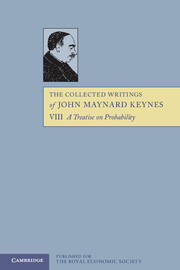Book contents
- Frontmatter
- Contents
- General Introduction
- Editorial Foreword by R. B. Braithwaite
- Editorial Note
- Preface to the First Edition
- I FUNDAMENTAL IDEAS
- 1 THE MEANING OF PROBABILITY
- 2 PROBABILITY IN RELATION TO THE THEORY OF KNOWLEDGE
- 3 THE MEASUREMENT OF PROBABILITIES
- 4 THE PRINCIPLE OF INDIFFERENCE
- 5 OTHER METHODS OF DETERMINING PROBABILITIES
- 6 THE WEIGHT OF ARGUMENTS
- 7 HISTORICAL RETROSPECT
- 8 THE FREQUENCY THEORY OF PROBABILITY
- 9 THE CONSTRUCTIVE THEORY OF PART I SUMMARISED
- II FUNDAMENTAL THEOREMS
- III INDUCTION AND ANALOGY
- IV SOME PHILOSOPHICAL APPLICATIONS OF PROBABILITY
- V THE FOUNDATIONS OF STATISTICAL INFERENCE
- Bibliography
- Index
8 - THE FREQUENCY THEORY OF PROBABILITY
from I - FUNDAMENTAL IDEAS
Published online by Cambridge University Press: 05 November 2012
- Frontmatter
- Contents
- General Introduction
- Editorial Foreword by R. B. Braithwaite
- Editorial Note
- Preface to the First Edition
- I FUNDAMENTAL IDEAS
- 1 THE MEANING OF PROBABILITY
- 2 PROBABILITY IN RELATION TO THE THEORY OF KNOWLEDGE
- 3 THE MEASUREMENT OF PROBABILITIES
- 4 THE PRINCIPLE OF INDIFFERENCE
- 5 OTHER METHODS OF DETERMINING PROBABILITIES
- 6 THE WEIGHT OF ARGUMENTS
- 7 HISTORICAL RETROSPECT
- 8 THE FREQUENCY THEORY OF PROBABILITY
- 9 THE CONSTRUCTIVE THEORY OF PART I SUMMARISED
- II FUNDAMENTAL THEOREMS
- III INDUCTION AND ANALOGY
- IV SOME PHILOSOPHICAL APPLICATIONS OF PROBABILITY
- V THE FOUNDATIONS OF STATISTICAL INFERENCE
- Bibliography
- Index
Summary
1. The theory of probability, outlined in the preceding chapters, has serious difficulties to overcome. There is a theoretical, as well as a practical, difficulty in measuring or comparing degrees of probability, and a further difficulty in determining them à priori. We must now examine an alternative theory which is much freer from these troubles, and is widely held at the present time.
2. The theory is in its essence a very old one. Aristotle foreshadowed it when he held that ‘the probable is that which for the most part happens’; and, as we have seen in chapter 7, an opinion not unlike this was entertained by those philosophers of the seventeenth and eighteenth centuries who approached the problems of probability uninfluenced by the work of mathematicians. But the underlying conception of earlier writers received at the hands of some English logicians during the latter half of the nineteenth century a new and much more complicated form.
The theory in question, which I shall call the frequency theory of probability, first appears as the basis of a proposed logical scheme in a brief essay by Leslie Ellis On the Foundations of the Theory of Probabilities, and is somewhat further developed in his Remarks on the Fundamental Principles of the Theory of Probabilities. ‘If the probability of a given event be correctly determined,’ he says,’ the event will on a long run of trials tend to recur with frequency proportional to their probability.
- Type
- Chapter
- Information
- The Collected Writings of John Maynard Keynes , pp. 100 - 120Publisher: Royal Economic SocietyPrint publication year: 1978



